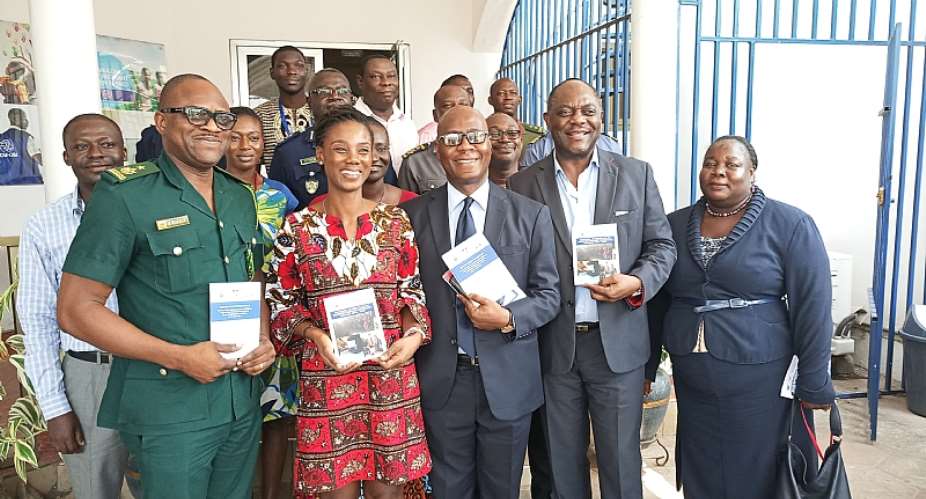The International Organization for Migration (IOM) with support from the Canadian Government has introduced a 5year National Action Plan on Counter Migrant Smuggling and Standard Operating Procedures (SOPs) geared towards combating migrant smuggling in Ghana, Togo, and Benin.
In addition, the development of the Standard Operating Procedures (SOPs) is to formalise information sharing and coordination at national and regional level agencies in each country.
TheAction Plan provides a coordinated framework for state and non-state actors to pursue a multi-sectoral fight against migrant smuggling in an integrated manner.
The Plan was imminent because of identified gaps in the existing national laws and acts in relation to ratified international protocols and best practices.
The aim of this plan is to provide a concerted holistic response to the threat of migrant smuggling through specifications and measurable key performance indicators.
The NAP is important because it presents a whole of government approach to Counter Migrant Smuggling programming in Ghanaby identifying specific tasks and the associated required resources.
The document was developed based on six pillars such as improved legislation, stringent law enforcing, public awareness creation, improved information gathering, and sharing, protection of migrant’s rights and regional cooperation.
It was estimated that about GH₵81million is required to implement the 5year plan which starts from 2019 to 2023.
Speaking at the ceremony, the Country Manager of International Organization for Migration (IOM) in Ghana, Sylvia Lopez-Ekra said the objective of the Anti-Crime Capacity Building Project (ACCBP) is to support the counter-smuggling efforts of Ghana, Togo, and Benin.
“We have to remain focus on why we are doing this. We are not doing it to have a National Action Plan, we are not doing it to have an SOPs. We are doing this because people have been smuggled into Ghana and Ghanaians have been smuggled out of the country and the success of what we are doing will be evaluated in terms of migrants and saving migrants lives,” she stated.
Sylvia Lopez-Ekra added that Ghana is the first country to have a National Action Plan on Counter Migrant Smuggling which uses the National Migration Policy as the background.
“The National Action Plan uses the National Migration Policy as the background to refine the counter smuggling aspect of the National Migration Policy. Ghana was one of the first countries in the region to have a National Migration Policy, it is now one of the countries to have a National Action Plan on Counter Migrant Smuggling,” she posited.
Speaking on the SOPs, she noted that counter smuggling does not operate in a vacuum because very often other transnational crimes happen at the same time in addition to terrorism and Ghana alone cannot manage those crimes without cooperation with its neighbours in terms of information sharing.
“It is important that we take the time to reflect a step back and think about what has been achieved and also, what lies ahead of us. We’ve had a lot of very successful training of frontline officers, maritime officers and training of trainers which means that now in Ghana we have a sizeable pool of trainers that can train others on counter smuggling and we hope that those trainings will continue. Some cascading was already done successfully in the three countries but we hope that the cascading will continue in a structured manner,” the Country Manager intimated.
According to her, they handed over equipment to the Ghana Immigration Service (GIS) to allow the frontline officers operationalize the training and skills they have received in terms of detecting of fraudulent documents.
The Chairman of the project steering committee/technical group, Laud Afrifah emphasized that the two important documents were developed from the Anti-Crime Capacity Building Project (ACCBP) which began in June 2016 adding that the two documents will be very instrumental in fighting the crime of smuggling in the West African sub-region.
He noted that the ECOWAS Protocol on Free Movement has encouraged more transitory routes that are used by smugglers to smuggle people to their destinations.
“Poor border infrastructure and lack of coordination mechanisms in the region have increased the problem in the sub-region,” he lamented.
Mr. Afrifah added that information sharing is a major tool in the fight against most transnational crimes and this kind of cooperation will enhance collaboration among the three countries in curbing the crime of migrant smuggling.
He indicated that some of the successes chalked by the project in addition to the launch of the two documents have been the building of capacity of government officials in the three implementing countries and the donation of fraud document detection equipment to beneficiary agencies.





 We’ll protect state wealth from opaque deals – Prof Jane Naana
We’ll protect state wealth from opaque deals – Prof Jane Naana
 Mauritania president says running for second term in June polls
Mauritania president says running for second term in June polls
 I won't ever say I was a mere driver’s mate' — Prof. Opoku-Agyemang
I won't ever say I was a mere driver’s mate' — Prof. Opoku-Agyemang
 2024 polls: 'EC struggling to defend credibility'— Prof. Opoku-Agyemang
2024 polls: 'EC struggling to defend credibility'— Prof. Opoku-Agyemang
 Akufo-Addo gov't's 'greed, unbridled arrogance, unrestrained impunity, sheer dis...
Akufo-Addo gov't's 'greed, unbridled arrogance, unrestrained impunity, sheer dis...
 Election 2024: Ghana needs an urgent reset, a leadership that is inspiring – Ma...
Election 2024: Ghana needs an urgent reset, a leadership that is inspiring – Ma...
 Partner NDC to rollout a future of limitless prospects – Prof Jane Naana Opoku-A...
Partner NDC to rollout a future of limitless prospects – Prof Jane Naana Opoku-A...
 NPP will remain in gov’t till Jesus comes — Diana Asamoah
NPP will remain in gov’t till Jesus comes — Diana Asamoah
 Sunyani Technical University demands apology from former SRC president over sex-...
Sunyani Technical University demands apology from former SRC president over sex-...
 'Dumsor' was resolved by Mahama but ‘incompetent' Akufo-Addo has destroyed the g...
'Dumsor' was resolved by Mahama but ‘incompetent' Akufo-Addo has destroyed the g...
